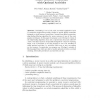Free Online Productivity Tools
i2Speak
i2Symbol
i2OCR
iTex2Img
iWeb2Print
iWeb2Shot
i2Type
iPdf2Split
iPdf2Merge
i2Bopomofo
i2Arabic
i2Style
i2Image
i2PDF
iLatex2Rtf
Sci2ools
112
click to vote
CP
2004
Springer
2004
Springer
Unary Resource Constraint with Optional Activities
Scheduling is one of the most successful application areas of constraint programming mainly thanks to special global constraints designed to model resource restrictions. Among these global constraints, edge-finding filtering algorithm for unary resources is one of the most popular techniques. In this paper we propose a new O(n log n) version of the edge-finding algorithm that uses a special data structure called -tree. This data structure is especially designed for "what-if" reasoning about a set of activities so we also propose to use it for handling so called optional activities, i.e. activities which may or may not appear on the resource. In particular, we propose new O(n log n) variants of filtering algorithms which are able to handle optional activities: overload checking, detectable precedences and not-first/not-last.
Artificial Intelligence | CP 2004 | Data Structure | Global Constraints | Special Global Constraints |
Related Content
| Added | 20 Aug 2010 |
| Updated | 20 Aug 2010 |
| Type | Conference |
| Year | 2004 |
| Where | CP |
| Authors | Petr Vilím, Roman Barták, Ondrej Cepek |
Comments (0)

